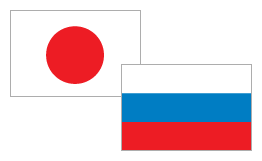
RUSSIA EYES STRONGER ECONOMIC TIES WITH JAPAN
RUSSIA EYES STRONGER ECONOMIC TIES WITH JAPAN
In the wake of Russian President Vladimir Putin’s recent visit to Tokyo, Russian officials have reiterated their calls for stronger economic ties with Japan. However, there have been no indications of movement towards a solution of the bilateral territorial row.
Disputed issues, including ownership of the Kuril Islands, should be solved within the framework of international law, Vasily Likhachev, deputy head of the international relations committee of the Federation Council, the upper house of the Russian parliament, told a visiting Japanese parliamentary delegation on December 12. However, he suggested closer bilateral economic ties, as well as cooperation in anti-terrorism and non-proliferation efforts (RIA-Novosti, December 12). Likhachev’s reference to international law appears to indicate Russian preference for the status quo in the territorial dispute.
In the meantime, Moscow still seeks ways to boost trade and investment ties with Japan, Asia’s top economy, and Russia, the world’s second-largest oil exporter. Bilateral annual trade turnover, estimated at about $10 billion this year, remains a fraction of Japan’s trade with China or the United States.
Russian Deputy Economic Development and Trade Minister Andrei Sharonov and Japanese Deputy Foreign Minister Mitoji Yabunaka discussed Japan’s possible role in developing Russia’s oil deposits as well as the construction of the East Siberia-Pacific pipeline. Sharonov said Russia was ready to consider Japanese proposals for tapping Siberian oilfields and building the pipeline. He also suggested holding a Russian-Japanese investment forum in St. Petersburg in the second half of 2006.
Yabunaka said Japan was interested in special economic zones in Russia and that Toyota’s decision to build a plant near St. Petersburg has helped to promote Japanese investments in Russia. However, both sides reportedly conceded that the current state of bilateral trade and economic relations is well below the economic potential of the two countries. Sharonov and Yabunaka reportedly pledged boost economic cooperation (RIA-Novosti, December 6).
Russian officials also indicated plans to develop economic ties with Japan in areas other than energy. Vladimir Strzhalkovsky, head of Russia’s Federal Tourism Agency, suggested increased bilateral tourist exchanges. He said that Russia seeks to attract more Japanese tourists to its Far Eastern regions, notably Primorsky region (RIA-Novosti, December 7).
Russian President Vladimir Putin’s November 20-22 trip to Japan for a summit in Tokyo with Prime Minister Junichiro Koizumi resulted in 12 generally worded documents aimed at strengthening their efforts against terrorism, to cooperate on energy, and to hold talks on ways to ease visa requirements to encourage business and tourism. However, the documents made no mention of the Kuril Island dispute.
Putin conceded that the lack of a peace treaty between the two neighboring countries remains a problem. Russia and Japan are prepared to continue their dialogue toward concluding a peace treaty that would put a formal end to World War II, Putin said on November 21. He added that the lack of a peace treaty hampered bilateral economic cooperation, including Japanese investments in Russia. “We will do anything possible to resolve this problem,” Putin said (RIA-Novosti, November 21).
On December 11 the official RIA-Novosti news agency cited an anonymous Japanese diplomatic source that claims Russia and Japan have agreed on a “new format” of bilateral dialogue. Tokyo is holding similar consultations with its main partners, including the United States, according to the source. Japan is to be represented by the country’s chief diplomat, while Russia would be represented by Security Council head Igor Ivanov, the source said (RIA-Novosti, December 11).
During Putin’s visit to Tokyo, the two countries agreed in principle that Japan would receive access to oil from the new Siberian pipeline. “The two countries agreed that an early and complete construction of the East Siberia-Pacific pipeline would meet the strategic interests of the two countries and would contribute to the development of East Siberia and Far Eastern Russia and contribute to the stabilization of energy markets in the Asia-Pacific region,” according to the bilateral statement on energy issues.
Japan and Russia agreed to work out the conditions for cooperating on the oil pipeline from Siberia to the Pacific coast in 2006. “The two countries will aim to seek mutual understanding by the earliest possible stage next year,” the statement said. However, it made no mention whether Japan or China would be the first recipient of Siberian crude oil.
Meanwhile, Moscow also tried to engage Seoul in its pipeline game. The Russian Industry and Energy Minister Viktor Khristenko has indicated that South Korea could join the Taishet-Nakhodka pipeline project by extending a loan to the Russian state-owned pipeline company Transneft. “Transneft’s rating is higher than sovereign, so it can get even an unsecured loan, without any collateral,” Khristenko said. He added that the first stage of the project envisioned the construction of a pipeline section from Taishet to Skovorodino and the building of an oil terminal in the town of Perevoznoi (RIA-Novosti, November 19).
However, Russian media speculated that Russia sought, but failed to sign, a major gas cooperation agreement with South Korea during Putin’s visit there on November 19. Notably, Kommersant claimed that Russian state-controlled gas giant Gazprom had planned to sign a major agreement on gas supplies to South Korea, including building a gas pipeline through the Korean Peninsula. However, the agreement failed to materialize because Moscow tried to include North Korea into the deal while Seoul remained reluctant to treat Pyongyang as an equal partner (Kommersant, November 21). So far, there have been no Russian official comments on the issue.


